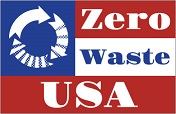
2019 ZWUSA Introduction To Zero Waste Quiz |
This short 11-question exam is designed to make you think carefully about what you learned in class. Do not rush through it.
On completion, you will receive an overall score, and each answer will be identified as correct or incorrect. If your score is less than 80%, please note the incorrect answers, review your notes and course materials and then retake the exam.
On completion, you will receive an overall score, and each answer will be identified as correct or incorrect. If your score is less than 80%, please note the incorrect answers, review your notes and course materials and then retake the exam.